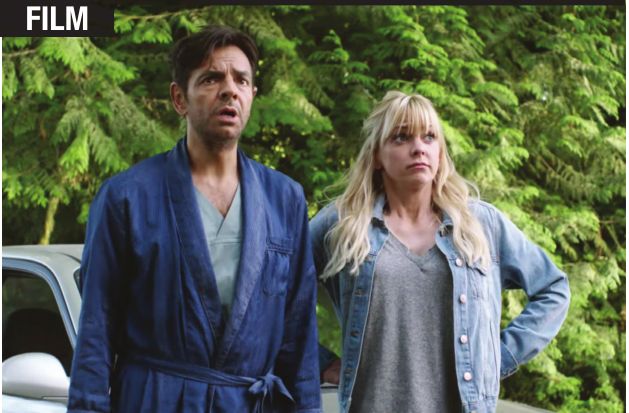
There’s really no reason for Rob Greenberg’s Overboard to exist. The 1987 original with Kurt Russell and Goldie Hawn is a perfectly serviceable light comedy that’s readily available on streaming services and has become a cornerstone of the TBS movie canon. Actually, the true purpose of this vehicle is to introduce American audiences to Eugenio Derbez, Mexico’s biggest movie star, one of the producers of this film, and, from the basis of this outing, a capable actor with an affable screen presence. I wouldn’t mind spending more time with him, which of course will be determined by the success of Overboard at the box office.
The obvious change from the original to this incarnation is the gender switch of the two leads. This time out, Anna Faris is the representative of the working class, a single mom named Kate with three kids who makes ends meet by delivering pizzas and working for a cleaning service. She’s in desperate need of help, as her mother (read “daycare provider”) has left her high and dry with her final nursing exams looming large in her very near future. Every day is a crisis, and things hit a new low when she’s sent to billionaire playboy Leonardo’s (Derbez) super-yacht to clean the champagne-soaked carpets. His arrogance runs up against her independent streak, and before you know it, she’s been tossed overboard with all of her equipment. He repeats this feat later in the night after he drunkenly stumbles into the drink, waking up on shore the next morning with amnesia.
The fun begins when Kate claims Leonardo as her husband and convinces him they are long-timed marrieds and that he’s a recovering alcoholic that works construction. Suddenly, the soft playboy is required to do manual labor as well as deal with an attractive woman who keeps him out of her bed and three young girls desperately in need of a father figure.
It’s easy to see why Derbez is so popular south of the border, and there’s no reason he can’t have a successful career in Hollywood if he chooses his projects wisely. His arrogance is tinged with a sense of boyishness that’s ingratiating, and when he’s required to be a working stiff his natural charm holds him in good stead. His scenes with the three young actresses playing his daughters have a natural feel to them, he can pull off physical comedy what with all the shenanigans he must deal with on the construction site, and he is genuinely romantic as well. The comedic elements at play here are old hat for Faris and she delivers the funny without breaking a sweat. The most pleasant surprise is the chemistry between the two leads, as they crack wise at each other with perfect timing, and there’s a general sense of camaraderie and respect between them that’s a delight to see. They’re likable enough for me to want to see them handed a better, more intelligent script.
The requisite happy ending is stumbled towards in the film’s awkward third act that can’t end soon enough. There are no surprises here except for the movie’s vision of today’s America. Mexican immigrants and American citizens are portrayed as honest, hard-working folk who may be business owners or bluecollar workers who are all upstanding citizens.
Everyone works together, helps each other out and embraces their respective cultures without threat of ridicule or prejudice. While some may see it as a naive notion, it serves as a vision of what is possible, a baby step towards finding a solution to what divides us. If nothing else, Overboard should be remembered for this.
Contact Chuck Koplinski at [email protected].